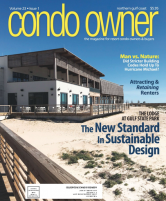Collection Strategies For Florida Condominium Associations
By Jay Roberts, Condo Owner Magazine, Volume 18, Issue 3 (Summer 2014)

The vast majority of condominium associations rely almost exclusively on owners timely paying assessments in order to meet the association’s obligations to maintain and operate the condominium. Florida law recognizes this fact and provides associations with various collection options. The Florida Condominium Act (the “Act”) provides for both “internal” and “external” collection methods. The purpose of this article is to discuss collection options authorized by law.
From an internal perspective, the Act provides that once a unit owner is more than 90 days delinquent in a monetary obligation owed to the association, the board of directors may suspend the unit owner’s voting rights and rights to use the common amenities. Regarding suspension of the common amenities, the Act does not authorize suspension of limited common elements intended to be used only by that unit, common elements needed to access the unit, utility services provided to the unit, parking spaces, or elevators. Additionally, the Act provides that if a delinquent unit is being rented, that the association may make a demand on the tenant to remit all rent owed to the landlord/owner to the association until the account is brought current. If the tenant complies, then he or she is protected by law against retaliation from the owner/landlord. If the tenant refuses to comply with the association’s demand, then the association has standing to evict the tenant. In Florida, the eviction process involves filing a lawsuit and obtaining an order of eviction from the judge. Due to this process, it has been the author’s experience that the rent demand works well for long-termed tenancies, but does not work well for weekly rentals.
From an external perspective, the Act provides that the association has a lien to secure assessments owed. In order to protect its claim of lien, the association must make an initial demand to the owner for the past amounts owed, wait 30 days, and if the debt is not paid the association may record a claim of lien in the official records of the county where the unit is located. Thereafter, the association must send the delinquent owner a notice of intent to foreclose the claim of lien stating that if the debt is not paid within 30 days, the association may proceed with filing a lawsuit to foreclose the claim of lien. If the unit is being rented during the course of the lien foreclosure lawsuit, the Act provides that the association may have the court to appoint a receiver to collect the rents during the pendency of the lawsuit.
If the association is successful in the lien foreclosure lawsuit, a final judgment will be issued which includes a damages number composed of the principal assessments owed, interest in the amount provided by the declaration of condominium (if any), late fees provided by the declaration of condominium or bylaws (if any), and the reasonable attorney’s fees and costs incurred by the association. The association will have a “credit bid” at the foreclosure sale, which is equal to the figures in the final judgment plus any post-judgment costs related to the foreclosure sale. The association is able to bid up to the amount of the credit bid without coming out of pocket. If a third party bids more than the association’s credit bid, then the association will be paid in full and there will be a new owner (subject to the lien rights of a superior lien holder, if any). If the association is the high bidder at the foreclosure sale, it will become the legal owner of the unit (subject to the lien rights of a superior lien holder, if any).
Separate from the lien rights held by the association, condominium unit owners are personally liable for all assessments coming due while they are owners, and joint and severally liable for all with the previous owner for all unpaid assessments owed at the time of the conveyance. The one caveat here is if the conveyance is to a first mortgage holder who acquires the unit via mortgage foreclosure or deed in lieu thereof. In that scenario, the first mortgage holder’s liability to the association for unpaid assessments coming due prior to the conveyance is the lesser of 1 percent of the original mortgage or 12 months unpaid assessments.
The list of permissible collection strategies discussed above are not mutually exclusive, so the association may initiate any combination therein. However, the law will not allow the association to gain a windfall of more than it is properly owed, therefore money collected using one technique applies to the debt of the unit owner as a whole. Not all collection activities work for all situations, and prior to taking any given collection action, the board should have conversations with the association’s attorney regarding the benefits and detriments regarding the strategy chosen by the association.
Jay was born and raised on the Emerald Coast and has been practicing community association, real estate, commercial litigation law in the Destin area since 2008. He has been with the law firm of Becker & Poliakoff, P.A. since 2011, and currently provides legal representation to community associations, developers, and local businesses from Perdido Key to St. George Island.
Bookmark the permalink.
Print Version

Leave a Reply